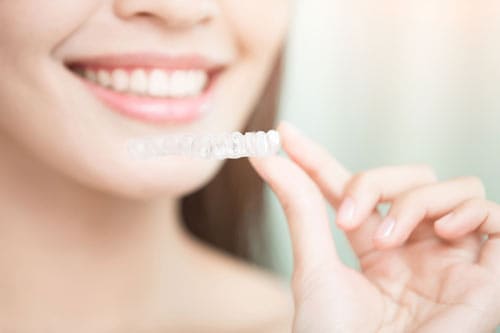Night Guards for Teeth Grinding
Do you suffer from teeth grinding?
Teeth grinding, also known as bruxism in medical terms, is a common phenomenon that affects many people, including children and adolescents.
What are the causes of teeth grinding?
The causes of teeth grinding, associated with tongue and teeth pressing, can be physical and/or psychosomatic in nature, such as stress or emotional strain. These unconsciously induced movement disorders primarily occur during sleep.
To identify and address the cause, a parafunction of occlusion is analyzed and, if possible, corrected. In addition, we work interdisciplinary with colleagues to exclude and treat physical components outside the masticatory apparatus.
What are the consequences of nighttime teeth grinding?
Teeth grinding manifests itself on the teeth, later on the gums, bone, and jaw joint. Soft tissue damage, such as an injured tongue and the inside of the cheek, are also common accompanying symptoms.
Consequences of teeth grinding include:
- Receding gums associated with bone loss
- Gum inflammation (gingivitis)
- Tooth fractures (cracks in the dental hard tissue), chipping of tooth enamel
- Worn-down teeth
- Impressions on the tongue edge and in the cheek
- Jaw joint damage
- Facial muscle tension
- Headaches
- Backaches
- Pain and tension, especially after waking up, in the facial and neck muscles
- Tinnitus
Consequences of teeth grinding for the jaw joint:
- Clicking during mouth movements
- Grinding noises
- Limited mouth opening
- Bayonet movement when opening/closing the mouth
- Pain when moving the jaw joints
- Radiating pain to the ears, cheeks, and temples
- Inflammation of the jaw joint
Teeth grinding results in many complaints that go far beyond the masticatory system. Head and neck pain, as well as back pain, can be caused by bruxism.
How can a night guard help with teeth grinding?
The symptoms of teeth grinding can be treated with a night guard. In this therapy, teeth and the jaw joint are protected from further damage. The bruxism guard is custom-made and adjusted to ensure maximum comfort. The night guard can be made for both the upper and lower jaw, although its use is most common in the lower jaw.
At the beginning, wearing the night guard at night may be perceived as bothersome, but once you get used to it, your sleep and jaw muscles will become significantly more relaxed. However, it is important to note that the night guard only alleviates the symptoms and does not address the underlying cause.
If the guard is not worn, it should be stored in a light-protected and dry box after cleaning. You will be thoroughly informed about cleaning and handling in our practice.
Online Booking


